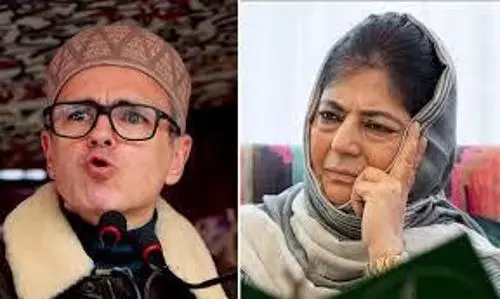
India caught between Iran and US
text_fieldsIndia which has been holding its spine straight by highlighting the non-alignment policy even during times when the cold war had momentum, is currently in a dilemma without being able to form a clear foreign policy- the country has to stand with the US; however it cannot irk Iran either.
What has put India in a quandary is US president Donald Trump's move to restore the sanctions and maintain the status quo by cancelling the nuclear deal made by Barack Obama's administration with Iran in 2015. . Trump who announced the restoration of sanctions May, has released a fiat to all the allied countries to abide by that. With that, the plan is to bring not only Iran but also all the countries that has been gaining strength in the region including India into his fold. Nikki Haley, the US ambassador to the United Nations who paid a visit to India on June 28 had made it plain. She stated that Iran was 'the next North Korea' and that India should rethink its relationship with Iran and decide whether it wants to continue doing business with it. Nikki Haley repeated Trump's threat that India must stop oil imports from Iran completely by November 4 or else the country would also have to face sanctions. This obstinacy of the US reins in not only the oil imports but also India's attempts to scale up to a strategic position in the region.
After Saudi Arabia and Iraq, Iran is India's biggest supplier of crude oil. The favourable factors of importing oil from Iran are the low shipping fee and extended credit term. The cost of importing oil from the US will be higher. Crude oil from Iran is less expensive than that from Saudi Arabia and Iraq as well. Although new assurances are given, it is certain that all those promises has no goal other than to benefit America's business. India calculates that it can enter the good books of the US by buckling under their pressure and thereby improving bilateral ties. It will be clear how far India's calculation will be a success after the talks with the US officials next week.
With India straining ties with Iran, not only the oil import, Farzad-B gas field development project jointly started by India and Iran and te basic infrastructure development of Chabahar port will be in trouble. During the 15th round of foreign office consultations between both countries held last Monday, the Chabahar port project in which India had made a huge investment , was a main subject of discussion.
However, if India withdraws from the oil trade which has been continuing by allowing special concessions for India in the form of export and import expenses, it is certain that Iran would reconsider other projects. The explanation by diplomatic sources that if India stops its oil imports, Iran would block Indian investments and the basic infrastructure projects, is a hint. Chahabar port in Iran is a way to link India with Afghanistan that bypasses Pakistan. India uses Afghanistan to strike back against Pakistan's cross border terrorism and also against the moves to destabilise India by exporting terrorism to other parts of the region. Chabahar port is the route to Kabul. If that is closed, the door to Afghanistan will be shut too. Also, India is contemplating linking this port to the International North-South Transport Corridor (INSTC) which makes the Indian route to Central Asia easy. Alongside crude oil, both the nations have developed strategic geographical participation.
India is in a fix over whether to accept or ignore Trump’s declaration dismissing all this. Even in the sanctions during Obama tenure, India and Iran overtly and covertly maintained relations. More, India then maintained that India would accept only UN-approved sanctions, and not US sanctions. Today, US has a capricious president in power. India on the other hand, is groping in the dark unable to take a firm stance on foreign policy. It was significant that Iranian Deputy Ambassador who said that Iran could understand the challenges faced by India, also reminded that India is a sovereign country which has always taken a firm stance with a view of its different interests.
What is needed is to evolve a lasting foreign policy keeping in mind the trade interests of the country, credible bilateral relations, market trends, geopolitical and economic equations of the region. Those who the country should realize that if we do not remain firm in a precise policy, we may not only jerk knees at the face of bullying, but even lose our ground.























